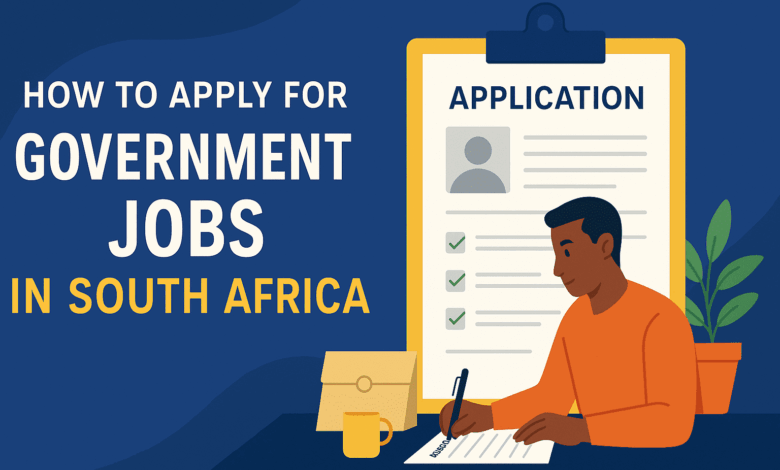
Securing a position within the public sector remains a dream for many South Africans. The reasons are clear — government jobs in South Africa offer stability, structured growth, good benefits, and the chance to contribute directly to national development. However, the process is often misunderstood, and many qualified applicants fail simply because they lack the correct guidance.
This in-depth guide breaks down everything you need to know about how to successfully apply for a government job in South Africa, including where to find vacancies, how to prepare your application documents, how to complete the Z83 form correctly, and what to expect in the recruitment process.
Why Government Jobs Matter in South Africa
Public sector employment remains one of the most sought-after career paths in the country. The South African government employs millions of people across national, provincial, and municipal departments.
Key Advantages:
- Job security even in economic downturns
- Pension fund contributions via GEPF
- Medical aid benefits
- Annual performance-based salary increases
- Opportunities for promotion through formal structures
- Access to further training and development programs
From education and health to engineering and law enforcement, the range of government jobs in South Africa is vast. READ: Top 10 In-Demand Jobs in South Africa
Step 1: Identify the Right Government Department
The first step is identifying which sphere of government (national, provincial, or local) you want to work for. Each has different departments, hiring protocols, and job categories.
Examples of National Departments:
- Department of Home Affairs
- Department of Health
- Department of Basic Education
- Department of Public Works and Infrastructure
- South African Police Service (SAPS)
- Department of Social Development
Provincial Examples:
- Gauteng Provincial Government
- Western Cape Education Department
- Limpopo Department of Health
Local Government:
- Municipalities (e.g., City of Cape Town, eThekwini Municipality)
- Metro Police
- Local clinics and schools
Once you identify your target department, you can search for specific government jobs in South Africa related to your qualifications and experience.
Step 2: Where to Find Government Vacancies
The South African government uses a centralized system to advertise most public service vacancies. You must regularly monitor these platforms to not miss deadlines.
Official Sources:
| Platform | Description |
|---|---|
| www.gov.za | Official SA government portal with links to all departments |
| DPSA Circulars | Weekly Public Service Vacancy Circular |
| Departmental Websites | Direct links to each department’s vacancies |
| National and Local Newspapers | Government Gazette and Sunday papers |
| Job Portals (secondary) | Careers24, Indeed (only for some departments) |
Search using exact terms such as “government jobs in South Africa”, followed by department or job title, to narrow results.
Step 3: Understand and Correctly Complete the Z83 Form
The Z83 form is a compulsory document used to apply for all public service vacancies. Submitting it incorrectly is one of the top reasons applicants are disqualified.
Where to Get It:
- DPSA Website – Download Z83
- Government departments
- Post offices and municipal offices
How to Fill It Properly:
- Use black ink and block letters if handwritten
- Fill ALL sections – if not applicable, write “N/A”
- Clearly indicate the reference number of the job
- Provide accurate contact details (especially email and phone)
- Attach certified copies of:
- South African ID or passport
- Educational certificates
- Driver’s license (if required)
Common Errors to Avoid:
- Using an outdated version of the form
- Leaving sections blank
- Attaching uncertified or expired documents
- Incorrect reference number
Tip: Never submit the Z83 form alone. Always include a comprehensive CV and supporting documents.
Step 4: Craft a Professional South African CV
A government CV should be:
- Structured, factual, and concise
- 2 to 4 pages in length
- Written in English
- Free of spelling or grammar mistakes
CV Must Include:
- Full name, ID number, contact info
- Qualifications (starting from highest)
- Work history (most recent first)
- Professional certifications
- Skills (relevant to job requirements)
- Languages spoken
- References (with contact numbers)
Remember: Most government jobs in South Africa require proof of prior experience. Be specific — list duties and responsibilities held in previous jobs.
Step 5: Submit Your Application
Methods of Submission:
- Email: Ensure all documents are in PDF format and labeled clearly (e.g., Name_CV.pdf)
- Hand Delivery: If required, submit at the department’s reception desk before 16h00 on the closing date
- Postal Mail: Address it properly using reference number and department
Always double-check whether the job advert requires one or more submission methods.
Step 6: Prepare for the Interview
If shortlisted, you’ll be contacted for an interview via phone or email.
What to Expect:
- Panel of 2–5 people
- Behavioral and scenario-based questions
- Questions testing your knowledge of the department’s mandate and South African legislation (e.g., Batho Pele Principles)
Documents to Bring:
- Certified ID and qualifications
- Printed CV
- Copy of Z83 form
Step 7: Final Verification and Appointment
If you pass the interview:
- Your references will be contacted
- A security clearance and criminal background check will be done
- You may undergo a medical fitness test
- Only then will an offer of employment be issued
The process can take 1–3 months depending on the department.
Final Advice to Boost Your Success
- Apply to multiple departments and roles
- Keep all documentation updated
- Set calendar reminders for job circulars
- Improve your qualifications with free online government courses (e.g., National School of Government)
- Always follow up after application
Conclusion
Applying for government jobs in South Africa requires patience, precision, and preparation. By following this guide, you’ll dramatically increase your chances of not only being shortlisted, but actually securing a job that offers long-term security and purpose.
Whether you’re a graduate, unemployed, or seeking a career change — the public service offers real opportunities for South Africans who are determined and well-prepared.